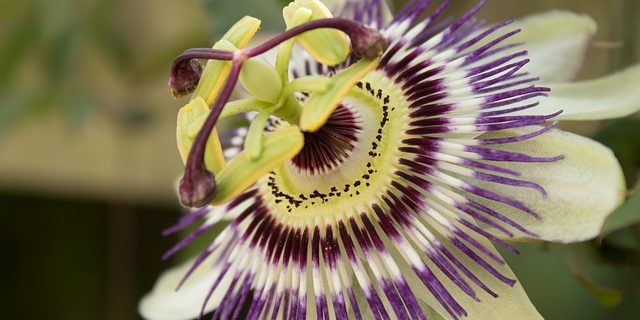You may know of Passionflower as a premier herb for stress, anxiety, and insomnia. This gorgeous flowering vine relieves pain, calms the mind, and relaxes the muscles. You can often find bees drowsing in the beautiful blossoms, proof of the passionflower’s soporific effect!
Passionflower was used by tribes in the Americas for millennia before making its way to Europe via colonial explorers. It was named “Passionflower” by Jesuit priests who came to South America with Spanish colonialists. The priests saw Christian symbolism in every aspect of the plant, and they named the herb Passiflora for the Passion of the Christ.
To the missionaries, the ten white petals represented the ten faithful apostles of Christ (Judas and Peter are excluded). The upraised corona is the crown of thorns, the five red stamens symbolize the five wounds of Christ, and the three styles of the pistils are the three nails used in the crucifixion. The curling tendrils symbolize whips, and the pointed leaves are said to represent either the hands of the enemy or the spear. Thus, Passionflower was brought from Peru in 1605 and presented to Pope Paul V, and it eventually made its way into the European pharmacopeia.
Medicinally, passionflower is a true friend to the nerves. It increases circulation and nutrition to the nerves themselves, and relieves nervous tension and stress-related digestive pain. Where there is stress-related insomnia, test/exam anxiety, or difficulty relaxing after work, passionflower is excellent. It is of great help when the mind races or gets stuck in a circular pattern of worry.
Like many nervines, passionflower combines well with other herbs and can be commonly found in sleep aids and stress formulas. In Europe, passionflower, hawthorn and valerian are popular as a sedative tea for children.
Passionflower is cooling by nature. It is excellent for people who run hot, and when stress leads to pent-up anger and inflammation. Passionflower’s cooling properties also make it a valuable topical medicine; the Cherokee and Houma tribes used passionflower externally to draw inflammation from wounds.
This lovely vine grows freely in the southern and eastern regions of the United States (and in the garden at Smile). Passionflower is the state flower of Tennessee, where it and its delicious fruits are known as “maypops”. In another month or two, stop by the shop to meet this gorgeous herb in person!








